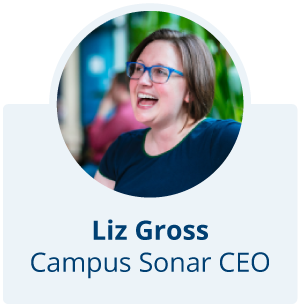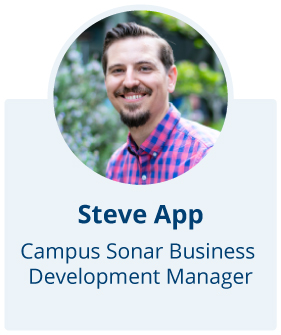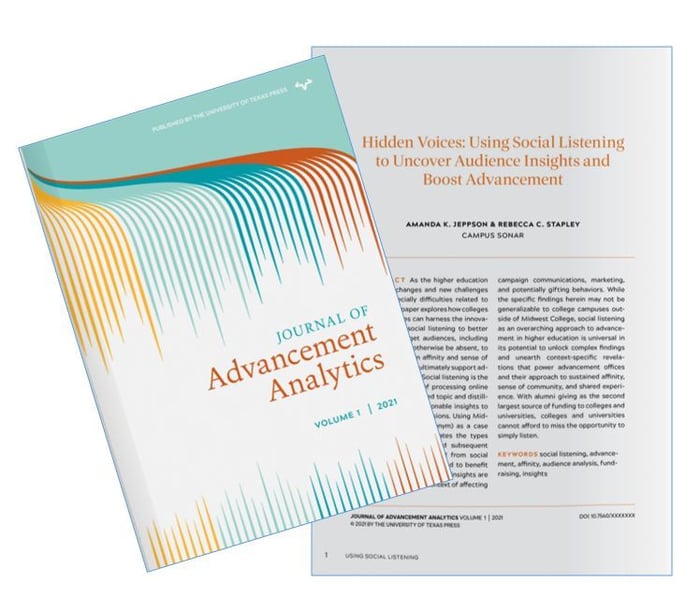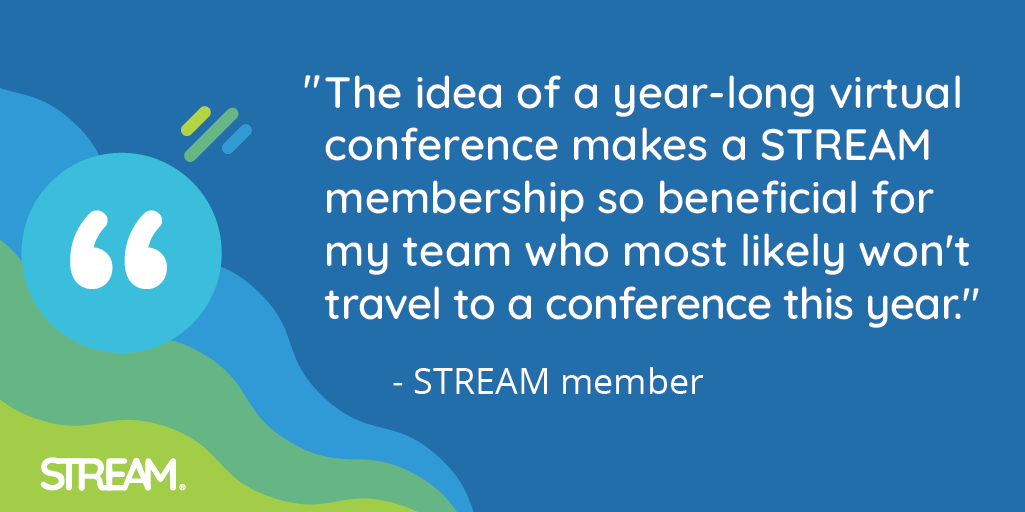Liz's Letter

Hi there,
After a long winter, spring is here. More than ever before, this spring brings with it a sense of optimism and a desire for a fresh start. Spring is a mood, and it makes me yearn for new growth in all aspects of my life: the vegetable garden (I’m growing 100+ varieties this year), my living space (will tidying truly be life changing for this mess-maker?), and my work. Our work—we’re in this together.
The springtime vibe is intensifying my desire to help you turn over a new leaf. To think critically about how social media informs and supports your most strategic work. I’ll just say it—you’ve been told a bunch of lies about social media, and the longer we hold on to these beliefs, the longer the path to legitimizing social media in higher education will be.
You know the false narratives I’m talking about.
- Followers and engagement rate are meaningful success metrics.
- Social media is a cesspool; a dumpster fire of negativity to be managed, not leveraged.
- Whatever strategy the top-ranked schools are following is what you should emulate.
These lies are perpetuated by social platforms that want your money and attention, so-called experts working from outdated assumptions, and well-intentioned social media professionals who are just trying their best to do their jobs. Buying into these ideas won’t contribute to your enrollment, marketing, or advancement goals, and it certainly won’t advance your craft or your career.
In the spirit of the season, I want to help you spring forward towards a holistic, data-driven approach to social media. One that is more hopeful than the lies we’ve been told. An approach built on truths that will shift your mindset.
- Social media is the largest source of online conversation about campuses, and the most positive.
- You’re not the only social voice for your institution; up to half of what’s said about most campuses online comes from non-campus voices, on social media.
- Measuring the entire social media conversation about your institution—not just your contribution to it—along with direct goal-related conversions prompted by social media content is a better way to assess your social media efforts than followers and engagement rate.
I (and my colleagues) want to help you embrace this hopeful approach. I’ve done a lot of talking lately; I’ve written articles, given presentations, and published a book. Now I want to listen. Tell me what’s holding you back. What information, tools, or abilities do you wish you had? Is there something about your current approach to social media that you want to talk through?
The fresh start of spring also brings new sounds. I live in the country, so right now that’s sandhill cranes, migrating geese, and the neighbor’s rooster. Another welcome sound would be the ding of my inbox, with a question from you, or the beginning of a dialogue. Get in there: lgross@campussonar.com. You’re not a burden. You’re a welcome springtime vibe.

P.S. If you're from a graduate or professional program, we have questions! Take my Twitter poll.
 Playing the Lottery
Playing the Lottery
It started February 3 with a simple message, “Congratulations on your admission to the University of Oregon! I’m Chloe, a UO student, and I’m part of the Flight Crew. We welcome new Ducks to the flock. I’m happy to help if you have any questions. Just text me!”
Texting programs have become a core piece of modern yield strategies. But occasionally, the messages student ambassadors receive aren’t as positive as the ones sent on their behalf.
For Chloe, the UO Flight Crew member, that meant receiving the following: “Shut da hell up Chloe ion wanna attend ur bum ass school.”
Such a message could easily have been the end of the exchange. Instead, it was only the beginning of the story. The post went viral on the popular subreddit, r/ApplyingToCollege, when the admitted student posted a screenshot and explained he mistakenly thought the text came from a bot. The screenshot received 8.8k upvotes and over 350 comments.
In the days following the post, “shut da hell up” became a catchphrase among prospects and admits. Redditors openly wondered if the exchange was real. Chloe became a sort of mythical figure. A week after the viral post, Chloe’s twin sister verified the exchange, and the following day, Chloe herself joined the A2C subreddit.
Chloe’s introductory post earned 7k upvotes and 385 comments, more engagement than the original viral post. She capitalized on her Reddilebrity status and went live on Instagram three days later; the following week, she hosted an AMA on Reddit. In total, Chloe generated tens of thousands of impressions for the University of Oregon, all because of a viral text exchange, and all without the knowledge of Oregon’s admissions office.
We’re entering a yield season unlike any other. Jon Boeckenstedt, Vice President of Enrollment Management at Oregon State University, compared making this year’s class to landing a fighter on an aircraft carrier, at night, in a storm, on an undulating deck.
I’m offering a different analogy. At a time when it’s nearly impossible to predict what might make a student enroll or not, making a class is akin to playing the lottery. And the best way to win the lottery is to collect as many tickets as possible.
In this analogy, online mentions of your campus and moments like Chloe’s three-weeks of Reddit fame represent lottery tickets. And while the University of Oregon may not need to worry about making their class, plenty of campuses do. For marketers specifically, listening to the conversation about your campus, and high-value mentions from prospects and admits in particular, is how you can increase your campus’s odds of winning the lottery.
In a recent conference presentation, Liz encouraged marketing and admissions professionals to prioritize Engagement Opportunities over Engagement Rate. After a year of isolation, we’re all starving for engagement. You may not be able to welcome students to campus for personalized tours, but you can meet them where they are, at the moment they’re talking about your campus, if only you’re willing to listen.
Lotteries, by their very nature, have long odds of winning. And indeed, many campuses will miss their class this year. But when so much is out of your control, the best thing you can do is excel at what is within your control. And right now, that’s collecting tickets, one online mention at a time. After all, you have to play to win.
Sonarian Shoutout
At Campus Sonar, we love celebrating each other; in fact, “shoutouts” is one of our team Slack channels. We want to give a big shoutout to Rebecca Stapley and Amanda Jeppson. Their work is published in the inaugural issue of the Journal of Advancement Analytics. Their article “Hidden Voices: Using Social Listening to Uncover Audience Insights and Boost Advancement” was one of the first six to be published. Way to go! We’re so proud of you!

What's New with STREAM
STREAM is our new membership service that unites social listening research, digestible insights, and a private community of peers. And we’ve been dropping new content every week. Since January, we've released content for two series—industry benchmarking and admissions.
- The industry benchmarks series helps you determine how your social media metrics match your industry peers, allowing you to move beyond vanity metrics and better align them to campus goals.
- Our admissions series, sponsored by Niche, helps you understand the true impact of the pandemic on admissions conversation—tying it back to key topics that have a direct impact on yield, where athletics fits in, and how parents contribute to the admissions journey.
Here's what we've heard so far from STREAM members.


See Us or Book Us
We hope to see you virtually this year at an upcoming event!
- CUPRAP Spring Professional Development Series—Three days of professional development spread from March to May. Check out the lineup and look for the Sonarian sessions on April 16 and May 12.
- HighEdWeb 2021 Analytics Summit—Join HighEdWeb for a one-day event on April 29 focused on using analytics more effectively in campus work. Liz’s session is Social Media Metrics that Matter.
If you’re looking for an industry expert to speak at an upcoming event or lead a workshop, check out our current speakers, common topics, and pricing.
Tell Us What You Think
Brain Waves Newsletter is for you—help us shape it. Send us an email to share what you think, suggestions, or what would help you do your job better.
